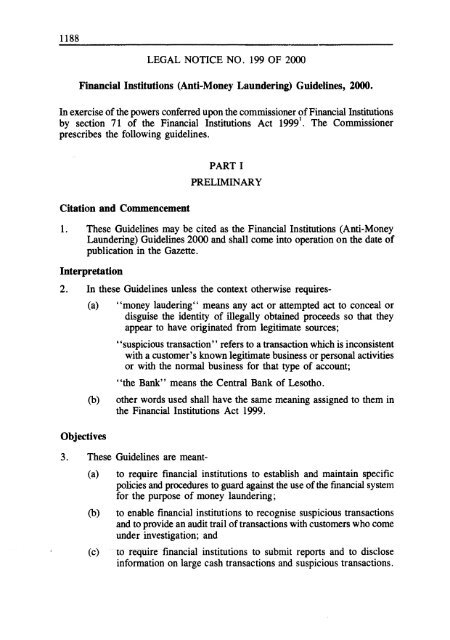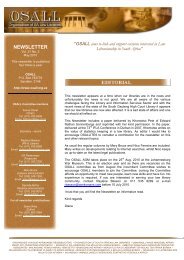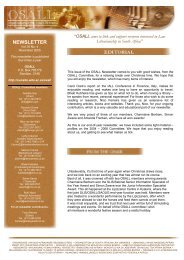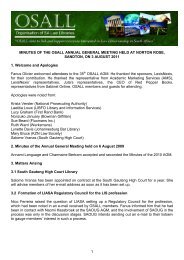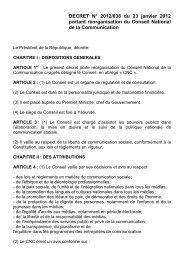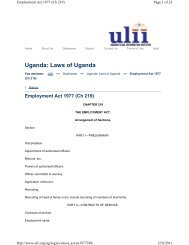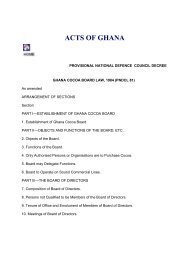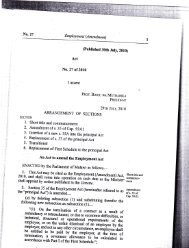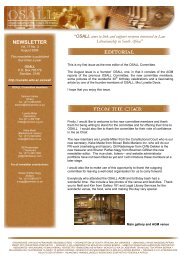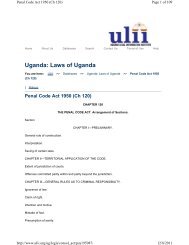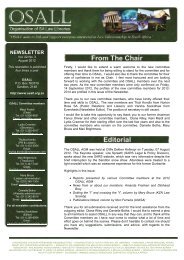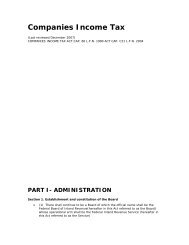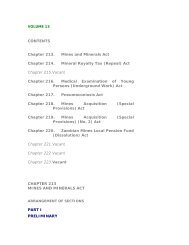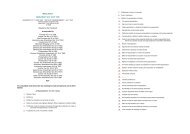Financial Institutions (Anti-Money Laundering) Guidelines of 2000
Financial Institutions (Anti-Money Laundering) Guidelines of 2000
Financial Institutions (Anti-Money Laundering) Guidelines of 2000
Create successful ePaper yourself
Turn your PDF publications into a flip-book with our unique Google optimized e-Paper software.
LEGAL NOTICE NO. 199 OF <strong>2000</strong><br />
<strong>Financial</strong> <strong>Institutions</strong> (<strong>Anti</strong>-<strong>Money</strong> <strong>Laundering</strong>) <strong>Guidelines</strong>, <strong>2000</strong>.<br />
In exercise <strong>of</strong> the powers conferred upon the commissioner <strong>of</strong> <strong>Financial</strong> <strong>Institutions</strong><br />
by section 71 <strong>of</strong> the <strong>Financial</strong> <strong>Institutions</strong> Act 19991. The Commissioner<br />
prescribes the following guidelines.<br />
PART I<br />
PRELIMINARY<br />
Citation and Commencement<br />
1. These <strong>Guidelines</strong> may be cited as the <strong>Financial</strong> <strong>Institutions</strong> (<strong>Anti</strong>-<strong>Money</strong><br />
<strong>Laundering</strong>) <strong>Guidelines</strong> <strong>2000</strong> and shall come into operation on the date <strong>of</strong><br />
publication in the Gazette.<br />
Interpretation<br />
2. In these <strong>Guidelines</strong> unless the context otherwise requires-<br />
(a) “ money laudering“ means any act or attempted act to conceal or<br />
disguise the identity <strong>of</strong> illegally obtained proceeds so that they<br />
appear to have originated from legitimate sources;<br />
‘‘suspicious transaction” refers to a transaction which is inconsistent<br />
with a customer’s known legitimate business or personal activities<br />
or with the normal business for that type <strong>of</strong> account;<br />
“the Bank” means the Central Bank <strong>of</strong> Lesotho.<br />
(b) other words used shall have the same meaning assigned to them in<br />
the <strong>Financial</strong> <strong>Institutions</strong> Act 1999.<br />
Objectives<br />
3. These <strong>Guidelines</strong> are meant-<br />
(a) to require financial institutions to establish and maintain specific<br />
policies and procedures to guard against the use <strong>of</strong> the financial system<br />
for the purpose <strong>of</strong> money laundering;<br />
(b) to enable financial institutions to recognise suspicious transactions<br />
and to provide an audit trail <strong>of</strong> transactions with customers who come<br />
under investigation; and<br />
(c) to require financial institutions to submit reports and to disclose<br />
information on large cash transactions and suspicious transactions.
SCHEDULE (regulation (13)(1))<br />
REPORT ON FRAUDS AND LOSSES<br />
(Name <strong>of</strong> <strong>Financial</strong> Institution)<br />
For quarter ending ................ .............................<br />
(Amounts to the nearest thousand)<br />
Date<br />
I. Actual<br />
Persons involved Amount Brief Description <strong>of</strong> Fraud/Loss<br />
II. Attempted<br />
Certified Correct:<br />
Name Signature Position Date
in the country where the registered <strong>of</strong>fices <strong>of</strong> those bodies or persons are located,<br />
shall ensure that they comply with these <strong>Guidelines</strong>.<br />
Records on Customer Identification<br />
8. <strong>Financial</strong> institutions shall keep records on customer identification such as<br />
copies or records <strong>of</strong> <strong>of</strong>ficial identification documents like passports, identity cards,<br />
driving licences or similar documents, account files and business correspondence<br />
for at least 10 years after an account is closed, and these documents shall be made<br />
available to law enforcement authorities in the context <strong>of</strong> relevant criminal<br />
procecutions and investigations;<br />
Maintenance <strong>of</strong> records<br />
9. (1) <strong>Financial</strong> institutions shall maintain, for a minimum period <strong>of</strong> 10 years,<br />
all necessary records to enable them to comply with information requests from<br />
competent authorities.<br />
(2) Such records shall be kept in sufficient form to permit reconstruction<br />
<strong>of</strong> individual transactions (including the amounts and types <strong>of</strong> currency involved,<br />
if any) so as to provide evidence for prosecution in criminal proceedings.<br />
Review <strong>of</strong> unusual transactions<br />
10. <strong>Financial</strong> institutions shall review and properly document the background<br />
and purpose <strong>of</strong> all complex, unusually large transactions, and all unusual patterns<br />
<strong>of</strong> transactions, which have no apparent economic or visible lawful purpose.<br />
Report on suspicious transactions<br />
11. If a financial institution suspects that any transaction by a customer may<br />
form part <strong>of</strong> a criminal activity or otherwise constitutes a suspicious transaction,<br />
it shall report such suspicions to the law enforcement authorities and the Bank<br />
forthwith.<br />
Secrecy<br />
12. <strong>Financial</strong> institutions and their directors and employees shall not warn their<br />
customers when information on suspicious transactions relating to them is being<br />
reported to the law enforcement authorities and the Bank.<br />
Co-operation with law enforcement authorities<br />
13. <strong>Financial</strong> institutions which report their suspicions in accordance with<br />
guideline 11, shall follow the instructions from, and otherwise co-operate with,<br />
the law enforcement authorities and Bank.<br />
Dealings with foreign persons<br />
14. <strong>Financial</strong> institutions shall exercise reasonable caution in their business<br />
and transactions with persons, including<br />
from<br />
other countries.
Application<br />
4. These <strong>Guidelines</strong> shall apply to all financial institutions in Lesotho.<br />
PART II<br />
ANTI-MONEY LAUDERING MEASURES<br />
Programmes against money-laundering<br />
5. (1) <strong>Financial</strong> institutions shall develop programmes against money laudering.<br />
(2) The programmes shall include, but shall not be limited to-<br />
(a) internal controls, policies, and procedures including the designation<br />
<strong>of</strong> compliance <strong>of</strong>ficers at management level;<br />
(b) customer identification procedures;<br />
(c) record keeping;<br />
(d) recognition and reporting <strong>of</strong> suspicious transactions; and<br />
(e) education and training <strong>of</strong> relevant employees.<br />
Anonymous accounts<br />
6. (1) <strong>Financial</strong> institutions shall not keep anonymous accounts or accounts in<br />
fictitious names.<br />
(2) <strong>Financial</strong> institutions are required to edentify, on the basis <strong>of</strong> an <strong>of</strong>ficial<br />
or other reliable identifying document and record, the identity <strong>of</strong> their customers,<br />
either occasional or usual, when establishing business relations or conducting<br />
transactions.<br />
(3) Without derogating from the generality <strong>of</strong> sub-guideline (2), that subguideline<br />
shall apply, in particular-<br />
(a) to the opening <strong>of</strong> accounts or passbooks;<br />
(b) to fiduciary transactions;<br />
(c) to the renting <strong>of</strong> safe-deposit boxes;<br />
(d) to the use <strong>of</strong> safe custody facilities; and<br />
(e) to large cash transactions.<br />
Disclosure <strong>of</strong> identity<br />
7. (1) In cases where a customer or client <strong>of</strong> a financial institution opens an<br />
account or conducts a transaction on behalf <strong>of</strong> another person, the financial institution<br />
shall require that customer or client to disclose the true identity <strong>of</strong> the person on<br />
whose behalf the account is opened or the transaction is conducted.<br />
(2) Without derogating from the generality <strong>of</strong> sub-gideline(1), registered<br />
companies, corporations, associations, partnerships, foundations, trust, attorney<br />
trusts or funds or other bodies or persons which or who do not conduct any<br />
commercial or manufacturing business or any other form <strong>of</strong> commercial operation
manner, the Bank may pursue any remedial measures at its disposal, including<br />
the imposition <strong>of</strong> penalty on the financial institution or any <strong>of</strong> its directors, <strong>of</strong>ficers<br />
or staff, under section 29 <strong>of</strong> the <strong>Financial</strong> <strong>Institutions</strong> Act 1999.<br />
Repeal<br />
20. The <strong>Financial</strong> <strong>Institutions</strong> (<strong>Anti</strong>-<strong>Money</strong> Laudering) <strong>Guidelines</strong>, <strong>2000</strong>ii are<br />
repealed.<br />
S. M. Swaray<br />
Governor, Central Bank <strong>of</strong> Lesotho<br />
i Act No. 6 <strong>of</strong> 1999<br />
ii L.N. 144 <strong>of</strong> <strong>2000</strong>


